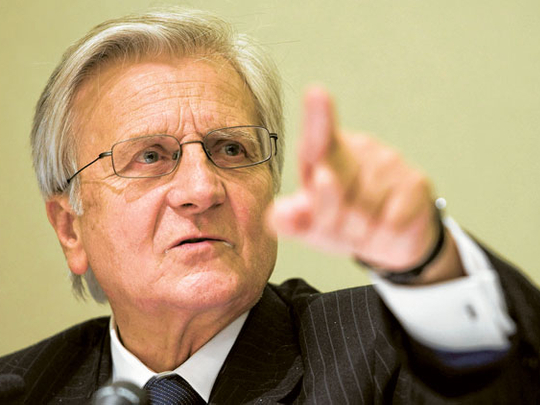
Zurich: European inflation held steady in August as a faltering recovery and retreating energy costs eased price pressures across the 17-nation euro region.
The inflation rate held at 2.5 per cent, the same rate as in July, the European Union's statistics office in Luxembourg said Thursday. That matches an initial estimate on August 31 and the median estimate of 30 economists in a Bloomberg News survey. Euro-region payrolls rose 0.3 per cent in the second quarter from the first, when they increased 0.1 per cent, a separate release showed.
European Central Bank president Jean-Claude Trichet on September 8 softened his tone on the region's inflation outlook, calling risks "broadly balanced". The central bank on that day kept its key interest rate at 1.5 per cent and lowered its growth forecasts for this year and next. European economic confidence slumped in August with consumers growing more pessimistic about their ability to save over the coming year.
"We expect the ECB to remain on hold until Dec-ember next year with risks skewed toward a rate cut over the next few months," Fabio Fois, an economist at Barclays Capital in London, said in an e-mailed note. Euro-region harmonised inflation rates are "likely to start declining from November onward".
Euro-area inflation may average 2.6 per cent this year and 1.7 per cent in 2012, the Frankfurt-based ECB said last week.
Economic growth may weaken to 1.3 per cent in 2012 from 1.6 per cent this year, the bank projected. That's down from a previous forecast of 1.9 per cent and 1.7 per cent for this year and next, respectively.
Job cuts
With the economy showing increasing signs of a slowdown and governments stepping up austerity measures, companies may struggle to pass on higher costs.
European manufacturing contracted in August and German investor confidence dropped to the lowest in two and a half years. European unemployment held at 10 per cent in July as companies in countries from Spain to Ireland continued to cut jobs.
In Germany, second-quarter employment rose 0.4 per cent from the first quarter, while French and Italian payrolls increased 0.3 per cent, the report showed. In Spain, employment rose 0.4 per cent and Portugal showed a 0.1 per cent increase.
"We expect the euro-area economy to grow moderately, subject to particularly high uncertainty and intensified downside risks," Trichet said last week. "Inflation rates are likely to stay clearly above 2 per cent over the coming months" before declining below the ECB's ceiling in 2012, he said.
Crude-oil prices have retreated 11 per cent in the past three months, leaving consumers with more money to spend just as economic growth weakens. A slump in household spending was among the reasons European economic growth slowed to 0.2 per cent in the second quarter from 0.8 per cent in the previous three months. Export growth also cooled in that period.
Euro-region core inflation, which excludes volatile costs such as energy and gives an indication of underlying inflation pressures in an economy, was steady at 1.2 per cent in August, yesterday's report showed.












